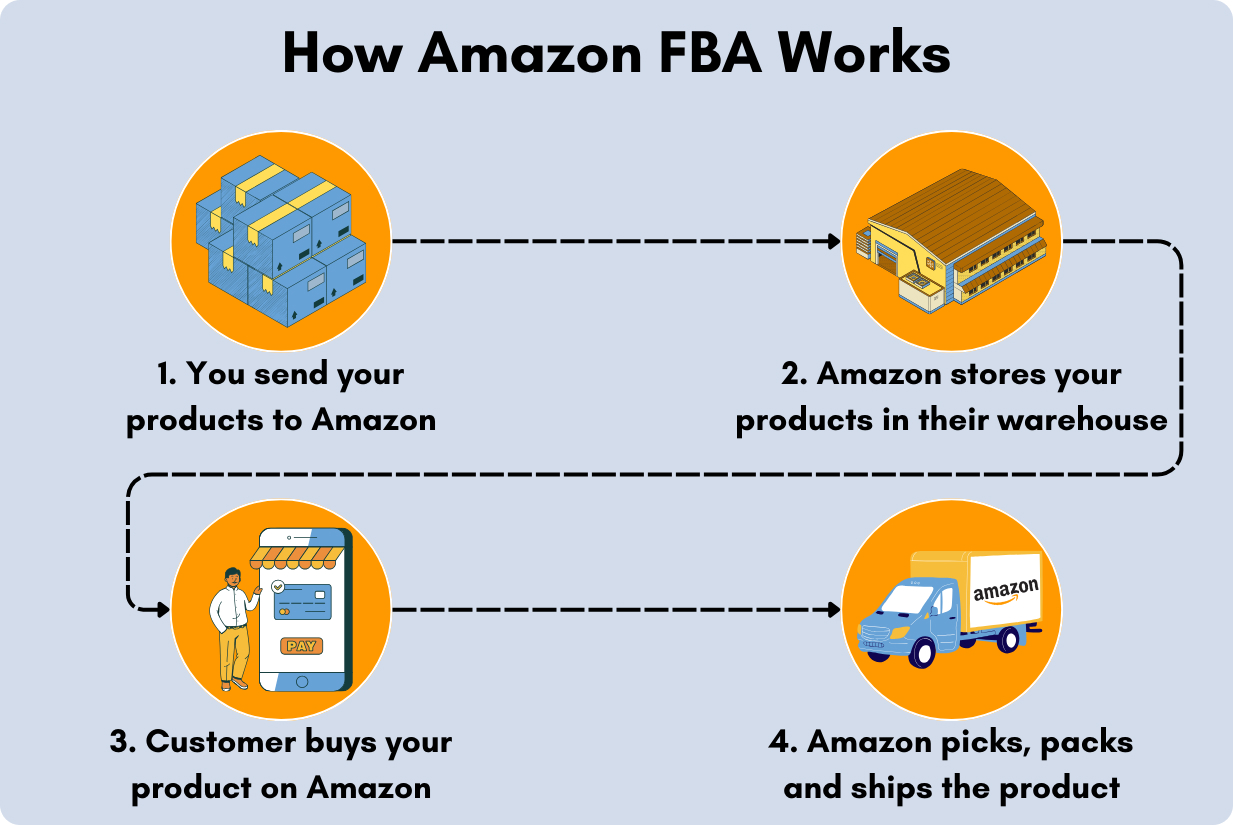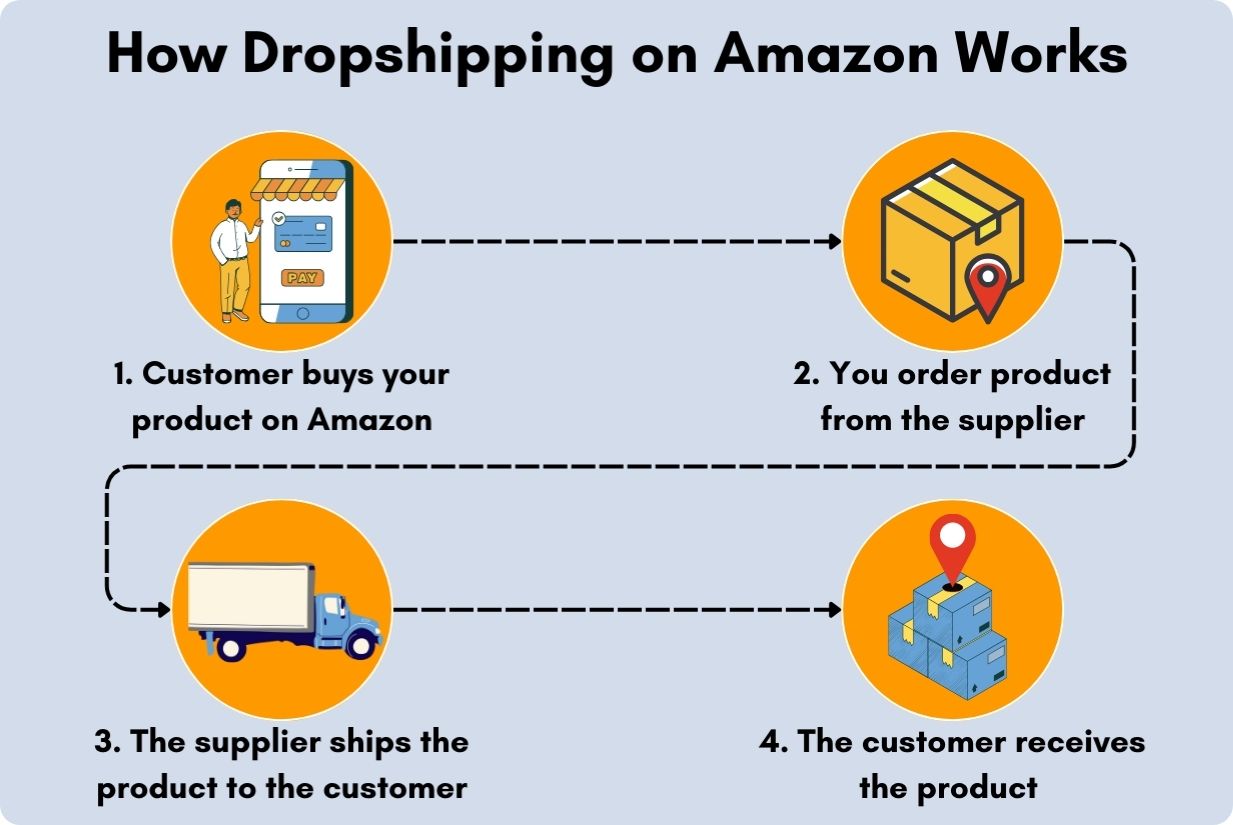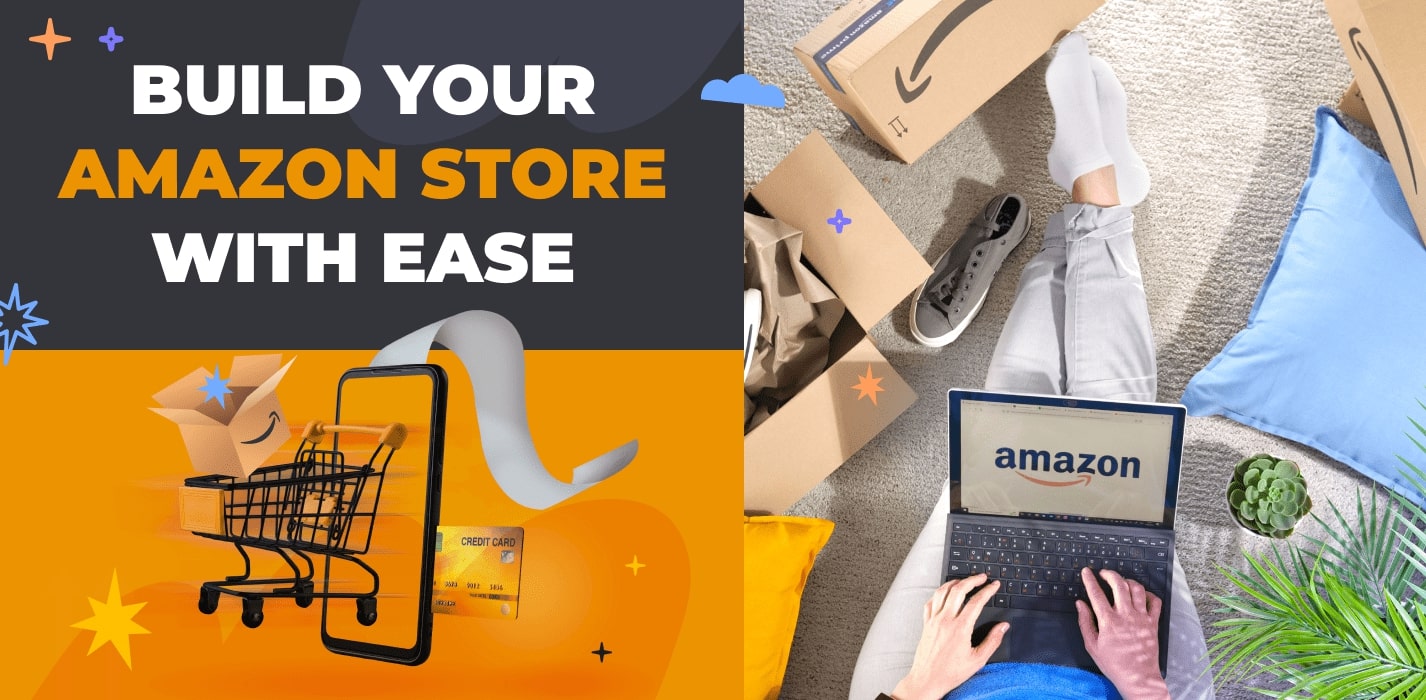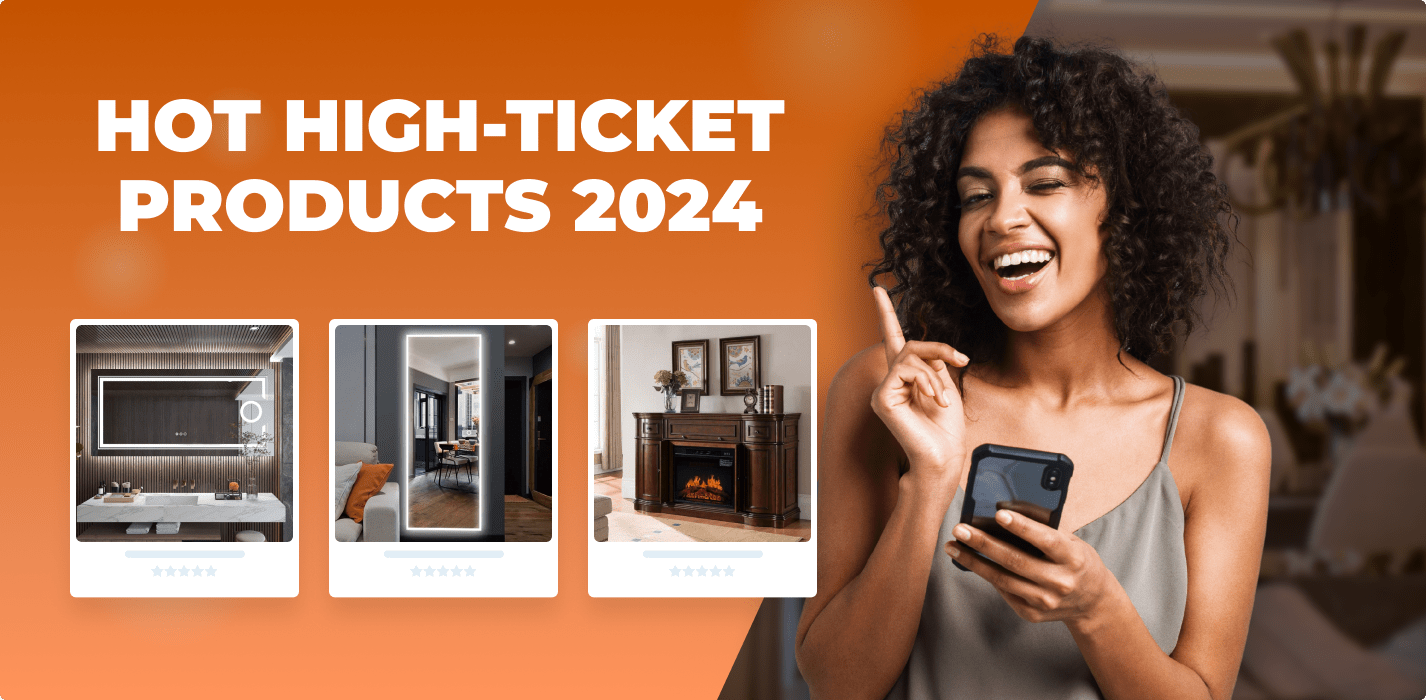Want to know how to start your own Amazon store in 2025 and don’t know where to begin? Don’t worry – it’s easier than you might think. Amazon makes it simple for beginners to get started, even if you’ve never run an online business before.
In this guide, we’ll show you how to start your own Amazon store, step by step. We’ll cover everything from setting up your account to adding your first products, so you can get your store up and running with ease. By the end, you’ll know exactly how to launch your store and start selling. Let’s take it one step at a time!

Why should you open an Amazon store?
Creating your own Amazon store comes with plenty of benefits, especially for beginners looking to build a brand. With Amazon’s store builder, you can design a personalized shopping space to showcase your products and tell your brand’s story – all without needing technical or design skills. Let’s explore the key advantages of setting up your Amazon store.
• Trust
Amazon is known for being a trusted brand. In 2024, it was ranked the most trusted brand by U.S. consumers, which means customers are more likely to shop from your store because it’s on Amazon.
• Easy Setup
Amazon’s Store builder is super easy to use. You don’t need any coding or design skills to create your store. With ready-made templates, you can add text, images, and videos to make your store unique. Plus, you can manage your store and business details on the go using the Amazon Seller app.

• Customization Options
Even though your store is on Amazon, you can still make it your own. Add your logo, colors, and product images to create a personalized shopping experience for customers.
• Mobile Optimization
Amazon ensures that your store works smoothly on all devices. This way, customers can shop easily whether they’re using a desktop, tablet, or smartphone.
• Marketing Tools
Amazon gives you tools to help promote your store. You can create ads, run promotions, offer discounts, and more to bring traffic to your products.
• Data Insights
The insights dashboard helps you track how your store is doing. You can see details like visits and sales, which will help you make smart decisions to improve your store and products.

• Ecommerce Infrastructure
Amazon takes care of the important things for you. With secure payment options, easy checkout, and automated processes, Amazon makes the shopping experience smooth for your customers. You can also use Fulfillment by Amazon (FBA) to store, pack, and ship your products.
• Support and Growth
If you need help, Amazon has a Service Provider Network to connect you with third-party services for account management, returns, and advertising. There are also tutorials available to help you learn more about running your business.
Amazon provides all the tools you need to build a successful store. With its trusted platform, easy setup, and powerful features, it’s a great option for anyone looking to start and grow their online business.
Steps to starting your own Amazon store
1. Pick your product niche
The first step of starting a store on Amazon is deciding what kind of products you want to sell – this is called picking a niche. A niche is a specific category of products that appeals to a certain group of people. For example, popular niches on Amazon include pet supplies, kitchen gadgets, fitness gear, and baby products.
Choosing a niche is key because it helps you stand out, focus your marketing, and attract loyal customers. But picking the right one takes a bit of thought. Here’s what you should look at:
- Demand: Are lots of people buying products in this niche? Look for something with steady, high demand to keep sales flowing.
- Competition: How crowded is the market? Go for a niche with low to moderate competition, as it will make it easier for your store to stand out and attract attention.
- Profitability: Can you make a good profit? Make sure the products can cover costs and still leave you with a decent margin.
- Passion: Do you actually like this niche? When you’re excited about your products, it’s easier to build a brand and deliver a great customer experience.

2. Choose a selling plan
Amazon gives you two options for selling plans:
- Individual Plan: Costs $0.99 per item sold. Great if you’re selling fewer than 40 items a month.
- Professional Plan: Costs $39.99 per month. Perfect if you’re selling over 40 items a month or want more features.
You can switch or cancel your plan anytime, so don’t stress too much about choosing right away.
3. Set up your seller account
Once you’ve picked your plan, it’s time to create your seller account. This is your main hub where you’ll manage everything – products, orders, payments, and more.
Here’s what Amazon will ask for:
- Business Name & Address: Use your legal name or a registered trade name.
- Phone Number & Email: Make sure they’re valid and easy for you to access.
- Bank Account & Credit Card: For payments and fees. Use one that supports the currency of your chosen marketplace.
- Tax Info: You’ll need to provide your tax ID and complete Amazon’s tax interview.
Once you’ve filled everything in, just agree to Amazon’s terms and pay your subscription fee (if you’re going Pro).
4. Launch your first product
This is where the fun starts! Launching your first product involves sourcing, listing, marketing, and of course, selling.
- Sourcing: Find a supplier for your product. Make sure they offer good quality, reasonable prices, and reliable shipping. Picking the right supplier is crucial – don’t rush this step. We’ll cover sourcing in more detail later, so stick around.
- Listing: Create a great product page using Amazon’s tools. Add a clear title, detailed description, high-quality photos, and a competitive price. If you’re using FBA (Fulfillment by Amazon), you’ll also need to label your products properly.
By the way, FBA isn’t the only option. There are good reasons to avoid it, and we’ll explain more in upcoming sections.
Ways to Sell on Amazon
When starting an Amazon store, there are two main ways to sell: Amazon FBA and Amazon FBM. Both options are beginner-friendly, but they work a little differently. Here’s a quick overview to help you decide which one suits you best.
• Amazon FBA (Fulfillment by Amazon)
With Amazon FBA, Amazon takes care of most of the work for you. You send your products to their warehouses, and when someone buys something, Amazon handles packing, shipping, and even customer service. While you’ll pay fees for these services, it’s a convenient way to reach millions of Amazon customers without worrying about logistics.

• Amazon FBM (Fulfillment by Merchant)
Amazon FBM gives you more control over the process. You’re responsible for storing your products, shipping orders, and managing customer service. If you choose dropshipping, your supplier ships the items directly to your customers, so you don’t need to keep inventory.

Next, we’ll compare Amazon FBA and FBM to help you pick the right approach for your store.
Key Differences Between Amazon FBA and Amazon FBM (Dropshipping)
If you’re new to online selling and unsure which method to choose, here’s a simple breakdown of Amazon FBA (Fulfillment by Amazon) and Amazon FBM (Fulfillment by Merchant). Both have their pros and cons, but FBM is often a better option for beginners who want to keep costs low and stay in control. Let’s explore why.
1. Inventory Management
- Amazon FBA: You purchase inventory upfront and send it to Amazon’s warehouses. While Amazon stores and manages your stock, you may face risks like unsold products and storage fees.
- Amazon FBM (Dropshipping): You don’t manage inventory. Instead, your supplier ships products directly to your customers, so you only pay for items you sell.
Why FBM is better for beginners: No upfront inventory purchases mean less financial risk and more freedom to try out different products.
2. Startup Costs
- Amazon FBA: Requires a larger initial investment. You’ll need to buy inventory, ship it to Amazon, and pay storage fees. This can be challenging for someone just starting out.
- Amazon FBM (Dropshipping): Has low startup costs. You only pay for products after your customers place orders.
Why FBM is better for beginners: It’s affordable and ideal for starting on a budget.

3. Profit Margins
- Amazon FBA: Fees for storage, fulfillment, and returns can reduce your profits, especially for lower-priced products.
- Amazon FBM (Dropshipping): You avoid these extra fees, leaving you with higher profit margins. Partnering with a reliable supplier like Sellvia ensures competitive prices and fast shipping, helping you maximize profits.
Why FBM is better for beginners: Fewer fees mean you can earn more while keeping things simple.
4. Shipping and Fulfillment
- Amazon FBA: Amazon provides fast shipping, but you’re locked into their system and must rely on their processes.
- Amazon FBM (Dropshipping): Shipping times depend on your supplier, but choosing U.S.-based suppliers like Sellvia allows you to offer fast, reliable delivery, comparable to Amazon Prime.
Why FBM is better for beginners: You can offer competitive shipping without paying Amazon’s fulfillment fees.

5. Scalability
- Amazon FBA: Growing your business means investing more in inventory and paying higher fees, which can make scaling expensive.
- Amazon FBM (Dropshipping): Scaling is easier since there’s no need to manage inventory or storage space. You can expand your product range with minimal risk by partnering with a reliable supplier.
Why FBM is better for beginners: You can scale your business without worrying about extra costs or storage limits.
For beginners, Amazon FBM (dropshipping) offers a simpler, lower-cost way to start selling online. With fewer fees, less risk, and more control over your business, it’s a great choice for anyone looking to launch and grow their store with confidence.
You can simplify things by teaming up with Sellvia. We’ll tell you about Sellvia and why it’s a top choice for launching your online store in the next section!
About Sellvia
Sellvia is a reliable partner for US dropshippers and a trusted supplier for Amazon dropshipping. Since 2015, we’ve built a strong reputation for being dependable and customer-focused. Our goal is to provide high-quality products and great support to make your business easier to manage.
Whether you’re just starting out or already have some experience with dropshipping, we’re here to guide you through every step of the process. With Sellvia, you’ll have the tools and support you need to grow your online business.
Why choose Sellvia as a partner to start your Amazon store
• Seamless integration with Amazon
Sellvia makes it simple to start selling on Amazon. Our platform connects smoothly with Amazon, so you can set up your store quickly. When customers place orders, we handle inventory and shipping, giving you more time to focus on growing your business.
• Shipping & fulfillment made easy
With traditional dropshipping, store owners often have to process orders and arrange shipping through third-party providers, which can be time-consuming and complicated. Sellvia changes this.
When a customer places an order, Sellvia handles everything – processing, packing, shipping, and delivering the product directly to your customer. If you use the deposit option, you don’t need to do a thing. This lets you focus on growing your business instead of worrying about logistics.
• Wide range of products
Sellvia offers a wide range of products across different categories like home, garden, electronics, and fashion. This variety helps you reach different customers and grow your store. All our products are carefully selected for quality, so you can sell with confidence.
• Competitive pricing
We offer wholesale prices, helping you maintain good profit margins. This allows you to offer great deals to your customers while still earning a solid profit.

• Exceptional customer service
Our support team is always ready to help. Whether you have questions or need help with tasks like product listings or order fulfillment, we’re here to make sure everything runs smoothly for your business.
Sellvia isn’t just a supplier – it’s a partner. Whether you’re just starting out or looking to expand, we’re here to help you succeed.
Start Your Online Business for FREE Today!
We’ll help you create the perfect online store, stocked with best-selling products. Your store will run on autopilot, making it simple to generate steady profits for years.
BONUS OFFER

When you act now, you’ll get an Amazon business package absolutely FREE (regular price: $399).
Here’s what’s included:
- A ready-to-use import file with top Amazon product listings for your store. This file makes it easy to upload popular items to your Amazon Seller account.
- A beginner’s guide to walk you through starting and selling on Amazon.
You’ll also enjoy:
- A fast and easy setup for your Amazon store.
- Access to 300 million shoppers on Amazon.
- A chance to benefit from Amazon’s $514 billion in yearly revenue.
Turn your passion into profits with ease. Act now – opportunities like this are rare!
Sellvia is here to help you succeed in the ecommerce world. Let us show you how to take advantage of the many opportunities that online selling offers!







![Amazon FBA Is Dead: What's Next? [Best Alternative]](https://sellvia.com/wp-content/uploads/2023/12/cover_Amazon-FBA-is-evil-min.png)
![Only $300k On Furniture Dropshipping? This Store Can Make Much More And Here's How! [Amazon Case Study]](https://sellvia.com/wp-content/uploads/2023/12/cover_300k-on-Amazon_-Easy-min.png)